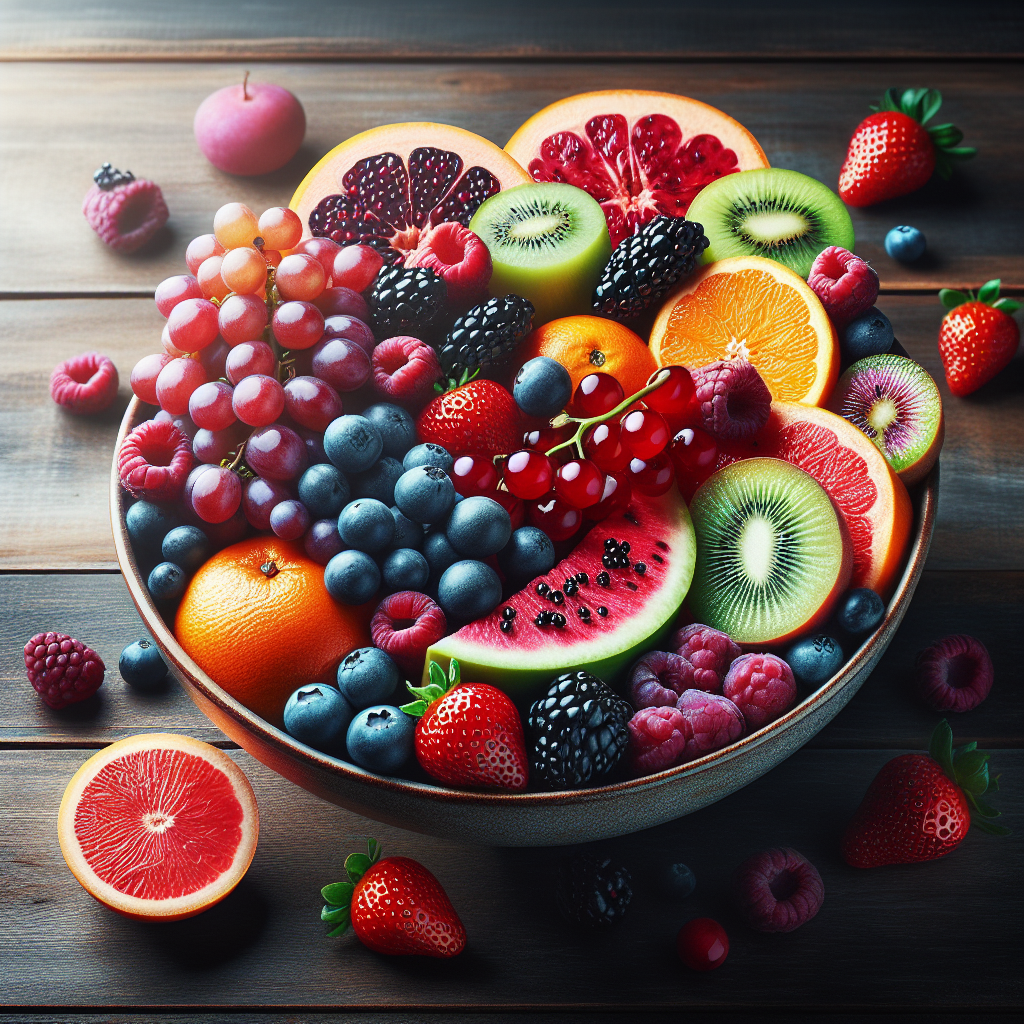Picture this: it’s a sunny morning, and you’re standing in front of a brightly colored display of fruit at your local grocery store. As you gaze at the array of options, a question starts to form in your mind: “What fruit should I eat every day?” We all know that fruits are an essential part of a healthy diet, but with so many choices, it can be overwhelming to decide which ones to incorporate into your daily routine. In this article, we will unveil the secret to finding the best fruit that not only tastes delicious but also provides a wide range of health benefits. So, get ready to discover the one fruit that will transform your mornings and energize your day!

1. The Importance of Eating Fruit Daily
1.1 Benefits of Eating Fruit
Eating fruit on a daily basis offers numerous benefits for your overall health and well-being. Not only are fruits packed with essential vitamins, minerals, and antioxidants, but they also provide dietary fiber, which is crucial for maintaining a healthy digestive system. Including a variety of fruits in your daily diet can help prevent chronic illnesses such as heart disease, certain types of cancer, and obesity. Moreover, fruits are naturally low in calories and high in water content, making them an excellent choice for weight management and hydration.
1.2 Recommended Daily Fruit Intake
The recommended daily fruit intake varies depending on factors such as age, sex, and level of physical activity. However, a general guideline suggests consuming at least 2 servings of fruit per day for adults. Each serving can be equivalent to approximately one medium-sized fruit or a half cup of chopped fruits. It is important to note that the daily intake should include a variety of fruits to ensure a diverse range of nutrients.
1.3 Impact of Regular Fruit Consumption on Health
Regular consumption of fruits has a positive impact on various aspects of health. Studies have shown that individuals who eat fruit daily have a lower risk of developing chronic diseases such as heart disease, stroke, and type 2 diabetes. Fruits contribute to overall improved cardiovascular health by reducing blood pressure, lowering cholesterol levels, and improving blood vessel function. Moreover, the high antioxidant content in fruits helps fight oxidative stress and inflammation in the body, promoting a healthy immune system and reducing the risk of certain cancers.
2. Factors to Consider When Choosing Fruits
2.1 Nutritional Content
When selecting fruits to incorporate into your daily diet, it is important to consider their nutritional content. Different fruits offer a wide range of vitamins, minerals, and antioxidants. For example, citrus fruits like oranges and grapefruits are rich in vitamin C, while berries are packed with antioxidants and fiber. By choosing a variety of fruits with different nutritional profiles, you can ensure that your body receives a wide range of essential nutrients.
2.2 Seasonal Availability
Seasonal fruits not only tend to be fresher and more flavorful but also often come at a lower cost. When selecting fruits, it is beneficial to choose those that are in season. Not only does this support local agriculture, but it also ensures that you are consuming fruits at their peak nutritional value. Seasonal fruits are often more abundant, making them more affordable and accessible for daily consumption.
2.3 Budget Constraints
For many individuals, budget plays a crucial role in fruit selection. While some fruits may be more expensive, there are always cost-effective options available. Fruits like bananas, apples, and oranges are often affordable and widely accessible throughout the year. Being mindful of your budget while selecting fruits will help you incorporate them into your daily routine without breaking the bank.
2.4 Personal Taste Preferences
Your personal taste preferences are also an important factor to consider when choosing fruits for daily consumption. If you enjoy the taste of a particular fruit, you are more likely to incorporate it into your diet regularly. Try experimenting with different fruits to find the ones that you genuinely enjoy. This will make the experience of eating fruit more enjoyable and sustainable in the long run.

3. Top 10 Fruits for Daily Consumption
Now let’s take a closer look at the top 10 fruits that are ideal for daily consumption, offering a wide array of health benefits and delicious flavors.
3.1 Apples
Apples are a popular fruit that can easily be included in your daily routine. They are rich in essential nutrients like vitamin C, dietary fiber, and antioxidants. Apples are known to promote heart health, aid in digestion, and provide a natural boost of energy. With their versatility in cooking and snacking, apples make for a satisfying and nutritious addition to your daily fruit intake.
3.2 Bananas
Bananas are packed with essential nutrients and provide numerous health benefits. They are a fantastic source of potassium, which is crucial for maintaining healthy blood pressure. Bananas also offer energy-boosting properties due to their natural sugars, making them an excellent pre-workout snack. Additionally, their easy digestibility and high fiber content contribute to healthy digestion.
3.3 Oranges
Oranges are renowned for their vitamin C content, making them a powerhouse of nutrients that can boost your immunity and overall health. This citrus fruit also contains antioxidants that help fight free radicals and protect your cells from damage. Oranges are not only delicious on their own but can also be juiced to enjoy their refreshing taste and maximize their nutritional benefits.
3.4 Berries
Berries, such as strawberries, blueberries, raspberries, and blackberries, are a treasure trove of antioxidants and fiber. These colorful fruits promote heart health, support brain function, and aid in maintaining a healthy weight. Berries are known for their potential anti-cancer properties and are a delicious addition to your daily fruit intake.
3.5 Grapes
Grapes are not only a delicious snack but also offer potential health benefits. They are rich in antioxidants, particularly resveratrol, which has been associated with anti-aging and heart-protective effects. Grapes can contribute to hydration due to their high water content and are a versatile fruit that can be enjoyed in salads, smoothies, or as a refreshing snack.
3.6 Kiwis
Kiwis are small fruits that pack a punch of nutrients. They are an excellent source of vitamin C and dietary fiber, promoting a healthy immune system and supporting digestive health. Kiwis are also rich in antioxidants and have been linked to improved skin health and collagen production. Their tangy and sweet flavor makes them a delightful addition to your daily fruit intake.
3.7 Papayas
Papayas are tropical fruits that are not only delicious but also offer numerous health benefits. They are rich in vitamin C, vitamin A, and folate, which contribute to immune function and healthy skin. Papayas are also known to aid digestion and promote a healthy heart. Adding papayas to your daily routine can bring a taste of the tropics while boosting your overall well-being.
3.8 Pineapples
Pineapples are a tropical fruit known for their vibrant taste and numerous health benefits. They are loaded with vitamin C, manganese, and bromelain, which supports digestive health and reduces inflammation in the body. Pineapples can be enjoyed fresh, juiced, or grilled, adding a burst of tropical flavor to your daily fruit intake.
3.9 Mangoes
Mangoes are not only delicious but also offer an abundance of health benefits. They are rich in vitamin C, vitamin A, and fiber, promoting a healthy immune system and digestion. Mangoes are known for their potential anti-inflammatory properties and have been linked to improved eye health. Their tropical flavor and creamy texture make them a perfect treat for daily consumption.
3.10 Watermelons
Watermelons are a summertime favorite that not only quenches your thirst but also provides an array of health benefits. With their high water content, watermelons are incredibly hydrating, making them an excellent choice for hot summer days. They are also packed with lycopene, an antioxidant associated with reducing the risk of certain cancers. Enjoy a slice of watermelon as a refreshing and nutritious addition to your daily fruit intake.
4. Apples
4.1 Nutritional Benefits
Apples are an incredibly nutritious fruit, packed with essential vitamins and minerals. They contain vitamin C, which is essential for immune function and collagen production. Apples also provide dietary fiber, helping to maintain a healthy digestive system and regulate blood sugar levels. Additionally, they are a good source of antioxidants, promoting overall well-being.
4.2 Health Benefits
Regular consumption of apples has been linked to various health benefits. Research suggests that apples may help lower the risk of heart disease by reducing cholesterol levels and blood pressure. They are also believed to have anti-inflammatory properties, contributing to reduced inflammation in the body. Moreover, apples have been associated with a reduced risk of certain cancers, such as colorectal cancer.
4.3 Versatility in Cooking and Snacking
Apples are not only delicious on their own but can also be incorporated into a variety of dishes. From apple pies and crumbles to salads and smoothies, the versatility of apples allows for creative and tasty culinary experiences. Whether you prefer a crispy Gala apple or a tart Granny Smith, there is an apple variety to suit every taste preference and recipe.
4.4 Apples as a Source of Fiber
One of the standout features of apples is their high fiber content. Fiber is essential for maintaining a healthy digestive system, promoting regular bowel movements, and preventing constipation. Furthermore, dietary fiber can help control appetite and contribute to weight management by providing a feeling of fullness. Incorporating apples into your daily fruit intake is an excellent way to increase your fiber intake and support overall digestive health.

5. Bananas
5.1 Nutritional Benefits
Bananas are not only a delicious and convenient snack but also provide numerous nutritional benefits. They are an excellent source of potassium, which plays a crucial role in maintaining healthy blood pressure and heart function. Bananas also contain essential vitamins such as vitamin C, vitamin B6, and dietary fiber, contributing to overall well-being.
5.2 High Potassium Content
Potassium is an essential mineral that helps regulate fluid balance, nerve function, and muscle contractions in the body. Bananas are particularly rich in potassium, making them an excellent choice for maintaining healthy blood pressure levels. Including bananas in your daily fruit intake can help reduce the risk of developing hypertension and support cardiovascular health.
5.3 Energy-Boosting Properties
Bananas are often referred to as a natural energy booster due to their high carbohydrate content. The sugars present in bananas are easily and quickly converted into energy, making them an ideal pre-workout snack or a quick pick-me-up during the day. Including a banana in your daily routine can help provide a natural and sustainable source of energy.
5.4 Easy Digestibility
Bananas are gentle on the digestive system and are often recommended for individuals with gastrointestinal issues. Their soft texture and high fiber content contribute to easy and smooth digestion. Bananas can help soothe an upset stomach and provide relief from indigestion. Incorporating bananas into your daily fruit intake can support a healthy digestive system and promote overall gut health.
6. Oranges
6.1 Vitamin C Powerhouse
Oranges are widely recognized for their high vitamin C content. Vitamin C is an essential nutrient that supports immune function, collagen production, and wound healing. Adding oranges to your daily fruit intake can help boost your immune system, protecting against common illnesses and promoting overall well-being.
6.2 Antioxidant Properties
Oranges are rich in antioxidants, which play a crucial role in neutralizing harmful free radicals in the body. Free radicals are unstable molecules that can cause cellular damage and contribute to the development of chronic diseases. By consuming oranges regularly, you can help protect your cells from oxidative stress and reduce the risk of certain illnesses.
6.3 Immunity Boost
A strong immune system is vital for fighting off infections and maintaining optimal health. Oranges can significantly contribute to boosting immunity due to their high vitamin C content. Vitamin C helps stimulate the production of white blood cells, which are essential for a robust immune response. Regular consumption of oranges can help protect against common colds, flu, and other infections.
6.4 Juicing Potential
Oranges are not only delicious to eat but also ideal for juicing. Freshly squeezed orange juice provides a concentrated dose of nutrients and antioxidants. Juicing oranges allows you to enjoy their refreshing taste while maximizing their nutritional benefits. Including orange juice as a part of your daily fruit intake can provide a quick and convenient way to enjoy the goodness of oranges.

7. Berries
7.1 Assortment of Berries
Berries, such as strawberries, blueberries, raspberries, and blackberries, offer a delightful assortment of flavors, colors, and textures. Each type of berry brings its unique set of health benefits. Strawberries are packed with vitamin C, blueberries are rich in antioxidants, raspberries are high in dietary fiber, and blackberries offer a wealth of vitamins and minerals. Incorporating a mix of berries into your daily fruit intake allows you to enjoy a diverse range of nutrients.
7.2 Rich in Antioxidants
Berries are known for their high antioxidant content. Antioxidants are compounds that help protect the body against oxidative stress and reduce inflammation. Regular consumption of berries has been linked to improved cardiovascular health, enhanced brain function, and reduced risk of chronic diseases such as heart disease and certain types of cancer. Including a variety of berries in your daily routine can have a significant positive impact on your overall health.
7.3 Promote Heart Health
Berries, especially blueberries and strawberries, have been associated with promoting heart health. They are rich in antioxidants called anthocyanins, which help reduce the risk of heart disease by improving cholesterol levels, reducing blood pressure, and enhancing blood vessel function. Consuming berries daily can be an enjoyable and effective strategy for maintaining a healthy heart.
7.4 Potential Anti-Cancer Properties
Several types of berries have shown promising potential in preventing and fighting cancer. Their high antioxidant content and various bioactive compounds have been found to inhibit the growth and spread of cancer cells in laboratory studies. While more research is needed, incorporating berries into your daily fruit intake may play a role in reducing the risk of certain cancers and supporting overall well-being.
8. Grapes
8.1 Potential Health Benefits
Grapes, both red and green varieties, offer a range of potential health benefits. They are a rich source of vitamins C and K, as well as several antioxidants. Grapes also provide dietary fiber and minerals such as potassium and manganese. Including grapes in your daily fruit intake can contribute to overall health and well-being.
8.2 Resveratrol Content
One of the key compounds found in grapes is resveratrol. Resveratrol has gained attention for its potential health benefits, including anti-aging and heart-protective effects. It is believed to improve blood flow, reduce inflammation, and lower the risk of cardiovascular diseases. By consuming grapes regularly, you can enjoy the potential benefits of resveratrol and support a healthy heart.
8.3 Hydration and Digestion
Grapes have a high water content, making them an excellent choice for hydration. Staying hydrated is essential for overall health, as it regulates body temperature, transports nutrients, and aids in digestion. Additionally, grapes contain dietary fiber, which supports healthy digestion and helps prevent constipation. Including grapes in your daily routine can contribute to optimal hydration and digestive health.
8.4 The Versatility of Grapes
Grapes are not only delicious as a fresh fruit but also versatile in various culinary applications. They can be enjoyed on their own as a snack, added to salads for a burst of sweetness, or used to make juices, smoothies, or even wine. The versatility of grapes allows for creative and enjoyable ways to incorporate them into your daily fruit intake.

9. Kiwis
9.1 Vitamin C and Fiber-Rich
Kiwis are small fruits with a unique flavor profile that offers significant nutritional benefits. They are packed with vitamin C, which supports immune function and collagen synthesis. Kiwis also provide dietary fiber, contributing to a healthy digestive system and weight management. Including kiwis in your daily fruit intake can provide a nutrient boost and promote overall well-being.
9.2 Digestive Health
Kiwis are especially beneficial for digestive health due to their high fiber content and natural enzymes. The enzymes in kiwis, called actinidain, help break down proteins and support effective digestion. Additionally, the fiber in kiwis promotes regular bowel movements and prevents constipation. Consuming kiwis daily can help support a healthy digestive system and alleviate gastrointestinal issues.
9.3 Antioxidant and Immune-Boosting Properties
Kiwis are rich in antioxidants, which help neutralize harmful free radicals and protect the body from oxidative stress. Their high vitamin C content not only boosts immunity but also supports collagen production and wound healing. By adding kiwis to your daily fruit intake, you can enhance your body’s defense against illnesses and promote overall health.
9.4 Collagen Production and Skin Health
Collagen is a vital protein that contributes to healthy skin, hair, and nails. Kiwis contain vitamin C, which plays a crucial role in collagen synthesis. Regular consumption of kiwis can support collagen production, improving skin elasticity and reducing the signs of aging. Including kiwis in your daily routine can help enhance your skin’s health and natural beauty.
13. Watermelons
13.1 Hydrating Properties
Watermelons are renowned for their incredible hydrating properties. With their high water content and refreshing taste, watermelons can effectively quench your thirst and prevent dehydration. Staying hydrated is essential for overall health, as it regulates body temperature, aids in digestion, and supports various bodily functions. Enjoying watermelon as a part of your daily fruit intake can keep you hydrated and feeling refreshed.
13.2 Lycopene-Rich
Watermelons are rich in lycopene, a powerful antioxidant that gives them their vibrant red color. Lycopene has been associated with numerous health benefits, including reducing the risk of certain cancers, protecting the skin against sun damage, and supporting heart health. By consuming watermelons regularly, you can enjoy the potential benefits of lycopene and promote overall well-being.
13.3 Promoting Cardiovascular Health
Watermelons can contribute to cardiovascular health due to their high levels of lycopene, citrulline, and potassium. Lycopene helps reduce oxidative stress and inflammation, which are key factors in the development of heart disease. Citrulline can help lower blood pressure and improve blood vessel function. Additionally, potassium is essential for maintaining healthy blood pressure levels. Including watermelons in your daily fruit intake can support a healthy heart and cardiovascular system.
13.4 Refreshing Summer Fruit
Watermelons are synonymous with summertime and are a perfect way to stay refreshed during hot weather. Whether enjoyed as sliced fruit, in fruit salads, or blended into refreshing smoothies, watermelons provide a naturally sweet and juicy option for summer enjoyment. Including watermelons as a part of your daily fruit intake can bring a burst of flavor and hydration to your summer routine.
In conclusion, incorporating a variety of fruits into your daily diet offers outstanding health benefits. From apples and oranges to berries and watermelons, each fruit provides a unique combination of essential vitamins, minerals, antioxidants, and dietary fiber. By selecting fruits based on nutritional content, seasonal availability, budget constraints, and personal taste preferences, you can enjoy the advantages of regular fruit consumption. From promoting heart health and boosting immunity to supporting digestion and providing hydration, fruits play a crucial role in maintaining overall well-being. So go ahead and seize the opportunity to enjoy the abundance of nature’s colorful and delicious offerings by including a daily dose of fruit in your routine. Your body will thank you for it!

